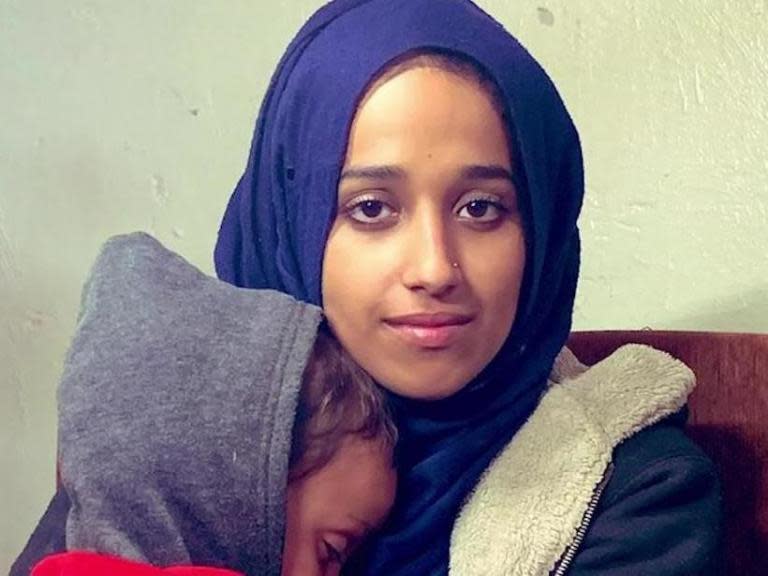Hoda Muthana: Trump claims responsibility for blocking Alabama Isis bride's return to US
Donald Trump has said he was behind the decision not to allow Isis bride Hoda Muthana back into the US.
The president claimed responsibility for the move announced by Mike Pompeo on Wednesday. Ms Muthana, of Alabama, left the country to join Isis in Syria in 2014 when she was a university student.
Mr Trump tweeted: “I have instructed Secretary of State Mike Pompeo, and he fully agrees, not to allow Hoda Muthana back into the Country!”
In a statement released on Wednesday, Mr Pompeo said Ms Muthana “does not have any legal basis, no valid US passport, no right to a passport, nor any visa to travel to the United States”. He gave no details on how the Trump administration had made its judgment on Ms Muthana’s citizenship status.
Hassan Shibly, a lawyer representing Ms Muthana’s family, said she had been born on US soil and that he intended to file a lawsuit challenging the decision.
He told CNN: “Hoda Muthana had a valid US passport and is a citizen. She was born in Hackensack, New Jersey in October 1994, months after her father stopped being diplomat.”
The Pompeo announcement came a day after the UK said that it had stripped Isis bride Shamima Begum, 19, of her British citizenship and ignited a fierce debate over whether it had made her officially stateless.
Ms Muthana, who joined Isis group after becoming radicalised, told ABC News she deeply regrets joining the terror group and is pleading to be allowed to return to the US with her 18-month-old son.
The young mother said she now rejects the extremist ideology that convinced her to abandon her family.
Ms Muthana gave a puzzling answer when asked why she left her parents’ home in Hoover, Alabama in 2014 to join Isis, which has a documented history of gendered violence and oppression of women. The 24-year-old said she abandoned her family and joined Isis because she yearned for a more “Americanised life”.
“I had a good relationship with my family but I wanted a more Americanised life,” she said. “I just wanted to go out, I wanted to have, like, friends, go to places. I didn’t get any of that.”
She added: “The only way out for me was to become practising...to become more religious.”
Ms Muthana, who left the US when she was 19, insisted that she was an innocent woman “manipulated” by extremists.
“I’m a normal human being who has been manipulated,” she added. “I hope America doesn’t think I am a threat to them and I hope they accept me. I hope they excuse me because of how young and ignorant I was.”
Before joining Isis, Ms Muthana was allegedly involved in a network of young Muslims who used Twitter to read up on extremist ideas.
The mother is one of 1,500 foreign women and children, many of whom are spouses and children of Isis militants, held in a Kurdish-operated detention camp in northern Syria. She is prohibited from leaving the camp and has armed guards protecting her from Isis supporters.
Ms Muthana – who fled Isis three weeks ago – said the father of her 18-month-old baby is dead. Her two previous husbands, both of whom were militants, are also dead.
Her first husband, Suhan Abdul Rahman, an Australian national, died in battle.
She defended her deceased husbands by claiming they were brainwashed by predatory Isis leaders who were “very wrong”.
Like other Isis brides, Ms Muthana said she chose her three husbands by picking them from a list of men in the terrorist group. She was kept in a room with “200 other brides” at one point and asked to pick a potential husband from the list.
Before Mr Pompeo’s statement, Ms Muthana told ABC News that she cried herself to sleep “almost every night” at the thought of being jailed in the US.
“Jail time, I don’t know if that has an effect on people,” Ms Muthana said. “I need help mentally as well, I don’t have the ideology any more but I am just traumatised by my experience.”
When asked what “reasonable form of punishment” she might receive for joining a terrorist group and urging for more violence against the US in social media, she said: “Maybe therapy lessons, maybe a process that will ensure us that we’ll never do this again.”
Mr Shibly, the family lawyer, told USA Today the US government had a responsibility to engage with Ms Muthana, and troubled or impressionable women like her.
“The government needs to engage with her, but not just her; all of these people [from North America and Europe] who joined Isis,” Mr Shibly said. “If she broke the law, then the justice system can deal with her, and if she didn’t break the law, she should come back anyway, so it can be determined if she is a threat.”

 Yahoo News
Yahoo News 
